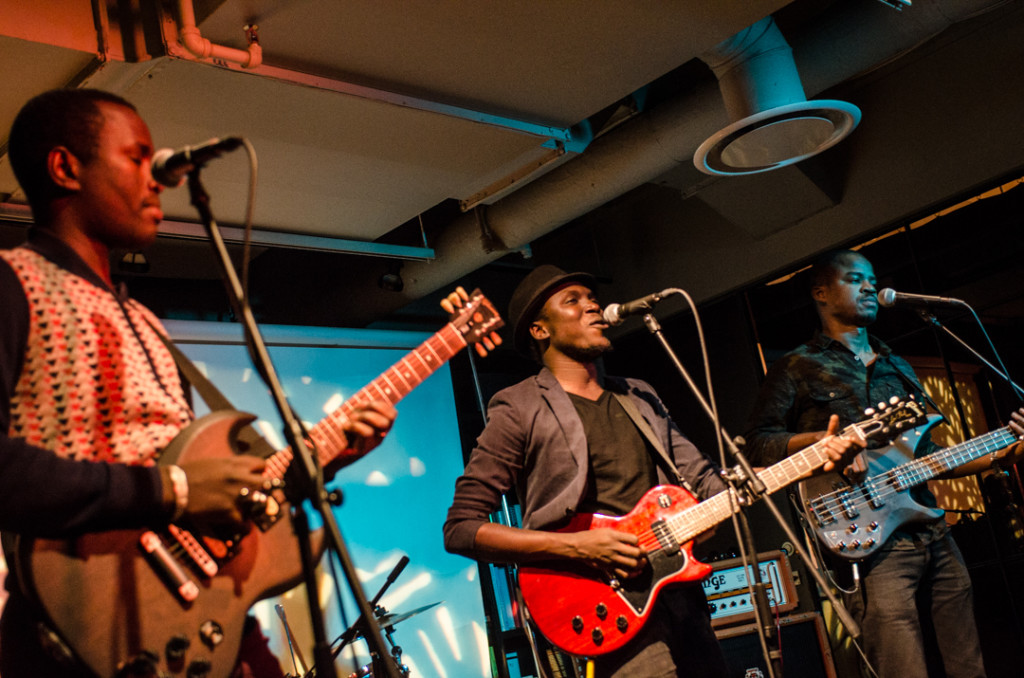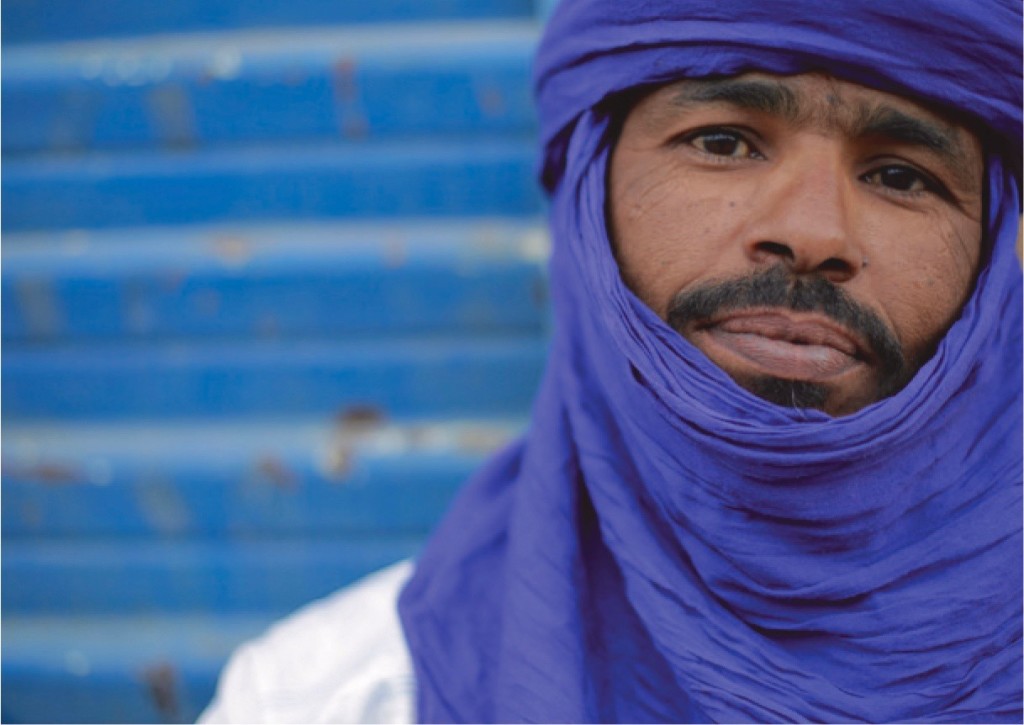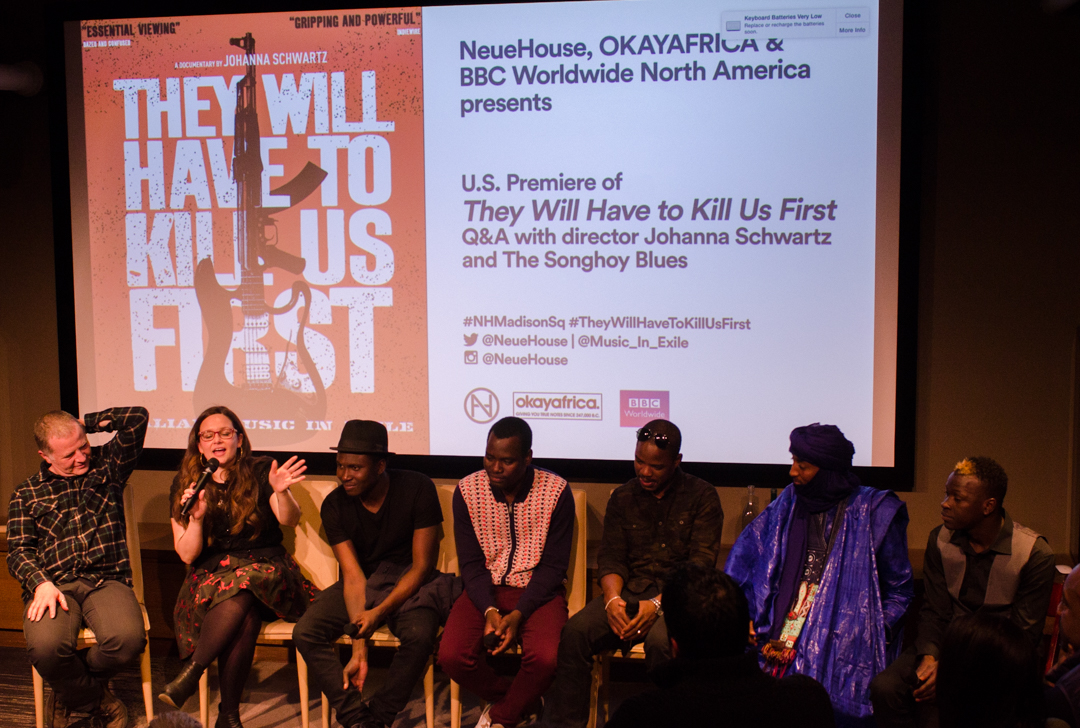Blog March 4, 2016
Film Review: They Will Have to Kill Us First
A powerful new film about Malian music and recent history debuted on March 3 in cities around the world, including screenings in 51 African countries and a soiree in New York that culminated in a fiery set by the band Songhoy Blues. The film’s title, They Will Have to Kill Us First, comes from a line uttered in near desperation by legendary Timbuktu singer Khaira Arby. She is contemplating a return to her beloved home town some two years after it was overtaken by violent jihadists who imposed strict Sharia law and banned all music before being expelled in a French-led military assault some eight months later. Arby’s declaration of willingness to die for her right to make music comes late in the film, but after what has passed on screen by then, any viewer will be convinced that she means it.
This is the first documentary by Johanna Schwartz, an American who has lived in London for some 20 years. She spent two of those years making bimonthly trips to Mali during the troubled years of the occupation in the north, a coup in the capital Bamako, the French military action, a presidential election, and the painful, ongoing process of restoring peace and returning hundreds of thousands of refugees to their homes. The film does not wade deeply into the complexities of this gnarly history. Instead it focuses on personal stories of key musicians, notably Arby, Fadimata “Disco” Walett Oumar of the Tuareg group Tartit, Moussa Sidi and Songhoy Blues. Through sequential interviews that unfold in real time, we experience the twists and turns of the crisis vividly and intimately. Never has the hope and beauty of Malian music, nor the agony of these cruel events been so palpably portrayed on the screen.
[caption id="attachment_27924" align="aligncenter" width="640"] Songhoy Blues[/caption]
Songhoy Blues was formed when a group of students from the north came together in exile in Bamako to sing about their experiences and insights. During the course of the film, they evolve from a promising bar band in crisis-wracked Bamako to a rock-solid act with global reach, touring Europe and playing in London’s Royal Albert Hall alongside Damon Albarn. Remarkable as this is, it’s the most conventional of the stories in this film: Talented African youth band gets discovered and finds fans in the West.
Elsewhere, we hear of a Tuareg singer/guitarist who flees Gao during the occupation, leaving his wife behind, then grieves her death after their house is bombed in a raid, and then rediscovers her miraculously alive, but traumatized and angry after six months in a Malian jail. We spend riveting time with Disco as she recounts her life married to a military man who, during the film, leaves the Malian army to join a Tuareg rebel group (MNLA), then returns to the army after the rebellion is co-opted by brutal jihadists. Meanwhile, Disco spends her time in a refugee camp in Burkina Faso, comforting and nurturing women who seem to have lost everything. Disco’s disarmingly frank statements about all of this are deeply affecting throughout, as are Arby’s musings on her own roller-coaster experience. The trust and openness Schwartz earned from these two stalwart women—one Tuareg and one Songhoy—makes this film truly special. The scene where the two women return to Timbuktu to perform side by side in 2014 is an emotional knockout. No hype needed. One feels privileged to witness it, even in the comfort of a movie theater.
Songhoy Blues[/caption]
Songhoy Blues was formed when a group of students from the north came together in exile in Bamako to sing about their experiences and insights. During the course of the film, they evolve from a promising bar band in crisis-wracked Bamako to a rock-solid act with global reach, touring Europe and playing in London’s Royal Albert Hall alongside Damon Albarn. Remarkable as this is, it’s the most conventional of the stories in this film: Talented African youth band gets discovered and finds fans in the West.
Elsewhere, we hear of a Tuareg singer/guitarist who flees Gao during the occupation, leaving his wife behind, then grieves her death after their house is bombed in a raid, and then rediscovers her miraculously alive, but traumatized and angry after six months in a Malian jail. We spend riveting time with Disco as she recounts her life married to a military man who, during the film, leaves the Malian army to join a Tuareg rebel group (MNLA), then returns to the army after the rebellion is co-opted by brutal jihadists. Meanwhile, Disco spends her time in a refugee camp in Burkina Faso, comforting and nurturing women who seem to have lost everything. Disco’s disarmingly frank statements about all of this are deeply affecting throughout, as are Arby’s musings on her own roller-coaster experience. The trust and openness Schwartz earned from these two stalwart women—one Tuareg and one Songhoy—makes this film truly special. The scene where the two women return to Timbuktu to perform side by side in 2014 is an emotional knockout. No hype needed. One feels privileged to witness it, even in the comfort of a movie theater.
 No surprise: The music in this film is a delight. The cinematography is gorgeously poetic. There is just enough news footage and audio to keep one in synch with fast-moving events. But the real power here comes from first-hand experience of the heartbreak, joy, resilience and sheer talent of the brave artists it profiles.
Visit www.theywillhavetokillusfirst.com to find a screening near you.
No surprise: The music in this film is a delight. The cinematography is gorgeously poetic. There is just enough news footage and audio to keep one in synch with fast-moving events. But the real power here comes from first-hand experience of the heartbreak, joy, resilience and sheer talent of the brave artists it profiles.
Visit www.theywillhavetokillusfirst.com to find a screening near you.
 Songhoy Blues[/caption]
Songhoy Blues was formed when a group of students from the north came together in exile in Bamako to sing about their experiences and insights. During the course of the film, they evolve from a promising bar band in crisis-wracked Bamako to a rock-solid act with global reach, touring Europe and playing in London’s Royal Albert Hall alongside Damon Albarn. Remarkable as this is, it’s the most conventional of the stories in this film: Talented African youth band gets discovered and finds fans in the West.
Elsewhere, we hear of a Tuareg singer/guitarist who flees Gao during the occupation, leaving his wife behind, then grieves her death after their house is bombed in a raid, and then rediscovers her miraculously alive, but traumatized and angry after six months in a Malian jail. We spend riveting time with Disco as she recounts her life married to a military man who, during the film, leaves the Malian army to join a Tuareg rebel group (MNLA), then returns to the army after the rebellion is co-opted by brutal jihadists. Meanwhile, Disco spends her time in a refugee camp in Burkina Faso, comforting and nurturing women who seem to have lost everything. Disco’s disarmingly frank statements about all of this are deeply affecting throughout, as are Arby’s musings on her own roller-coaster experience. The trust and openness Schwartz earned from these two stalwart women—one Tuareg and one Songhoy—makes this film truly special. The scene where the two women return to Timbuktu to perform side by side in 2014 is an emotional knockout. No hype needed. One feels privileged to witness it, even in the comfort of a movie theater.
Songhoy Blues[/caption]
Songhoy Blues was formed when a group of students from the north came together in exile in Bamako to sing about their experiences and insights. During the course of the film, they evolve from a promising bar band in crisis-wracked Bamako to a rock-solid act with global reach, touring Europe and playing in London’s Royal Albert Hall alongside Damon Albarn. Remarkable as this is, it’s the most conventional of the stories in this film: Talented African youth band gets discovered and finds fans in the West.
Elsewhere, we hear of a Tuareg singer/guitarist who flees Gao during the occupation, leaving his wife behind, then grieves her death after their house is bombed in a raid, and then rediscovers her miraculously alive, but traumatized and angry after six months in a Malian jail. We spend riveting time with Disco as she recounts her life married to a military man who, during the film, leaves the Malian army to join a Tuareg rebel group (MNLA), then returns to the army after the rebellion is co-opted by brutal jihadists. Meanwhile, Disco spends her time in a refugee camp in Burkina Faso, comforting and nurturing women who seem to have lost everything. Disco’s disarmingly frank statements about all of this are deeply affecting throughout, as are Arby’s musings on her own roller-coaster experience. The trust and openness Schwartz earned from these two stalwart women—one Tuareg and one Songhoy—makes this film truly special. The scene where the two women return to Timbuktu to perform side by side in 2014 is an emotional knockout. No hype needed. One feels privileged to witness it, even in the comfort of a movie theater.
 No surprise: The music in this film is a delight. The cinematography is gorgeously poetic. There is just enough news footage and audio to keep one in synch with fast-moving events. But the real power here comes from first-hand experience of the heartbreak, joy, resilience and sheer talent of the brave artists it profiles.
Visit www.theywillhavetokillusfirst.com to find a screening near you.
No surprise: The music in this film is a delight. The cinematography is gorgeously poetic. There is just enough news footage and audio to keep one in synch with fast-moving events. But the real power here comes from first-hand experience of the heartbreak, joy, resilience and sheer talent of the brave artists it profiles.
Visit www.theywillhavetokillusfirst.com to find a screening near you.







